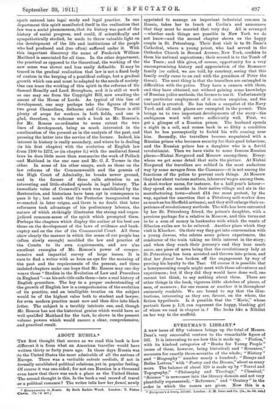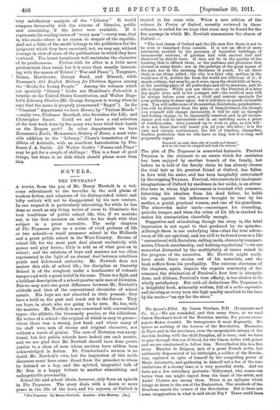EVE RYMAN'S LIBRA RY.*
A NEW issue of fifty volumes brings up the total of Messrs. Dent's very successful venture to the remarkable figure of 561. It is interesting to see bow this is made up. "Fiction," with its kindred categories of "Books for Young People " (some of these, however, being historical) and "Romance," accounts for exactly three-sevenths of the whole; "History" and " Biography " number nearly a hundred ; " Essays and Belles Lettres," with " Poetry and the Drama," about as many more. The balance of about 120 is made up by " Travel and Topography," "Philosophy and Theology," "Classical;" "Science" (a newcomer into the literary domain and not very plentifully represented), " Reference," and " Oratory " in the order in which the names are given. Now this 'is a • Breryman's L brary, 513-601. London : J. M. Dent and Co. as.: Zs. dd. nem
very satisfactory analysis of the " Library." It would compare favourably with the returns of libraries, public
and circulating, if the latter were available. If it represents the reading tastes of "every man "—every man, that is, who reads—there is no reason to despair of the republic. Ana not a little of the credit belongs to the publishers for the judgment which they have exercised, not, we may say, without courage in view of some of the publications in which they have ventured. The latest instalment well maintains the character of its predecessors. Fiction with its allies is• a little more predominant than usual, but it is more than usually interest- ing with the names of Tolstoi (" War and Peace "), Turgeniev, Balsac, Hawthorne, George Sand, and Disraeli, while Freeman's Old English History for Children figures among the "Books for Young People." Among the volumes which are specially "library" books are Hamilton's Federalist, a treatise on the United States Constitution, and Walter Bage- hot's Literary Studies (Mr. George Sampson is wrong when he says that the name is properly pronounced " Bagot"). In the " Classical " department we have Horace, by " Various Hands " —really two, Professor Marshall, who furnishes the Life, and Christopher Smart. Could we not have a real selection of the best work done by the many who have tried their hands on the Roman poet ? In other departments we have Rousseau's Emile, Mommsen's History of Bone, a most valu- able addition to the "Library," Chase's translation of the Ethics of Aristotle, with an excellent Introduction by Pro- fessor J. A. Smith. All Walter Scott's "Poems and Plays" may be got for a couple of shillings ! This is a feast of good things, but there is no dish which should please more than this.











































 Previous page
Previous page